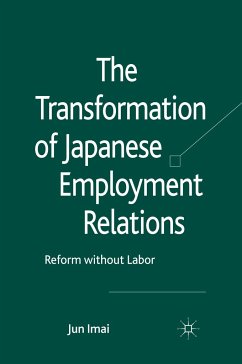This book systematically evaluates the impacts of deregulatory reforms on employment relations in Japan especially focusing on the core white collar workers. Concentrating on changes in three aspects of employment relations; contracts, employee mobility and worker effort, it examines the process of social negotiation and its results.
'This book will be of great interest to academics working in the field of Japanese labour and employment, to those interested in comparative employment relations more broadly and to Japanese policymakers...the book does a very valuable job of pulling together a lot of Japanese source material for the English language reader...a valuable contribution to the academic literature on Japanese employment.' - Helen Macnaughtan, School of Oriental and African Studies, Japan Forum
'...a highly useful resource...' - Social Science Japan
'In his overall analysis the relationship between structure and agency sometimes remains ambiguous, as an emphasis on the imperatives of growing white-collar employment and international competition coexists with highlighting the role of radical deregulationists in driving change. Nevertheless, Imai's final argument concerns the importance of developing a more effective strategy and voice for employees if the costs of restructuring forlabour are to be addressed.' - Work, Employment, & Society
'...a highly useful resource...' - Social Science Japan
'In his overall analysis the relationship between structure and agency sometimes remains ambiguous, as an emphasis on the imperatives of growing white-collar employment and international competition coexists with highlighting the role of radical deregulationists in driving change. Nevertheless, Imai's final argument concerns the importance of developing a more effective strategy and voice for employees if the costs of restructuring forlabour are to be addressed.' - Work, Employment, & Society








